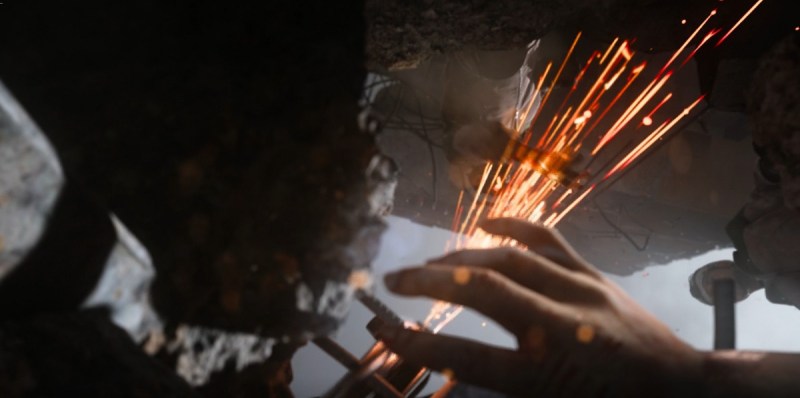
Above: The White Helmets rescue a trapped child in Modern Warfare.
GamesBeat: I saw The Last Men in Aleppo, the movie about the White Helmets (who rescue bombing victims and identify themselves as non-combatants with white helmets). It was very evocative of what they have to go through in that very quick scene, what this is like. That was one of those things that felt very real to me. What does Modern Warfare mean in 2019? It’s people having to dig people out of the rubble.
Kurosaki: We’ve watched that documentary, and a lot of documentaries like that. Speaking for myself, as a father of a young child, those things are very hard to watch. I think they’re important to watch. It certainly gives me perspective on the privilege that I have. I just can’t imagine being in a circumstance where I couldn’t protect my son, where it was out of my control. I don’t think there is a ton of awareness of the true cost of war, not just for soldiers, but for the people who never asked to be in a conflict zone. The conflict zone came to them.
Because Farah, as a character, is — again, I’m generalizing a bit. Her background is different, certainly, from mine, and I’m going to guess from yours, and probably from 99 percent of the people that play this game. That’s why we go into her backstory. We could all just right now make up backstories for Kyle and Alex and Price. We could draw on inspiration from our own childhoods, or childhoods we’ve seen in things that are related to the kind of world we live in. Those things are less critical to shaping them into the people that they are.
For Farah, in order for you to have empathy for her, and for you to have understanding of what she went through and how it shaped who she is, I think it’s important to see how different her background is from ours. That’s why that’s included.
June 5th: The AI Audit in NYC
Join us next week in NYC to engage with top executive leaders, delving into strategies for auditing AI models to ensure fairness, optimal performance, and ethical compliance across diverse organizations. Secure your attendance for this exclusive invite-only event.
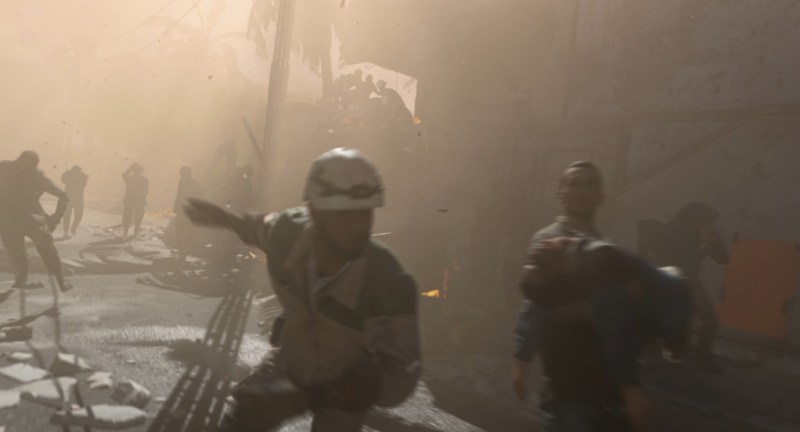
Above: White Helmets fleeing from bombs in Modern Warfare.
GamesBeat: She becomes this very inspiring hero and leader out of this. It seems important to have that kind of character in this kind of game, because we haven’t seen many heroes like that in most western stories.
Kurosaki: I felt it was our responsibility, frankly. The game is not called “Western Warfare.” It’s not GI Joe. It’s Modern Warfare. Her story — stories like that are all too common, and every bit as much a part of what defines that, the soldier’s story today.
GamesBeat: It gets to an interesting situation between Farah and her brother.
Kurosaki: We can talk about that too. When the player in our story — when Alex first meets Farah and Hadir, he says, “I have a problem. I need you to help me with it.” She says — I think she’s taken aback a little bit. Something she says on the heels of that is, “We live like this every day. You’re coming in because you have a big problem, because nerve gas may turn up in London or Paris or New York. We live under the spectre of this every day. Now that it’s important to you, you come to me. But you don’t really know anything about me.” He will, and so will you as you play those flashbacks. But he knows he needs her help on the ground.
Then Hadir comes in and he says, “Oh, this great. This is some help. Alex can help us.” Alex defers and says, “Your sister is in charge. She decides. She’s the commander.” Hadir says, “Yes, my sister is in charge, and the Russians are still occupying our country.” Then he kind of shoots her a look, and she shoots him one back and says….
GamesBeat: Don’t discuss this outside the family. That Godfather thing.
Kurosaki: Yeah. You can tell that there’s tension between the two of them. Right in that moment, you can see that he’s agitating for more action, for more definitive measures.
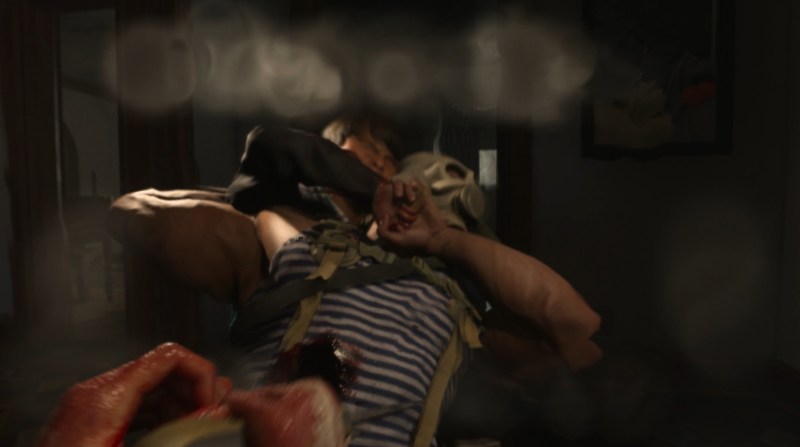
Above: A flashback to children in hand-to-hand combat in Modern Warfare.
GamesBeat: He wants to draw the line farther out there.
Kurosaki: Exactly. And then talking about the flashback mission, Hometown, they’re both participants in that. They’re both there. I think if you look at that mission as a whole and you see the events that they both went through, I think you could extrapolate out that one of them may want to hold on to everything that she defines as shaping her humanity, as strongly as she can, and maybe he wants to do whatever he can to prevent that from happening to someone else’s family.
It’s interesting. This is a little behind the scenes, but when we auditioned the actors who play Farah and Hadir, we had these longer scenes where Alex is talking to each of them individually. There wasn’t actually an Alex at this point, but the character who’s a surrogate for Alex says to Farah, “You’re fighting against enemies who will resort to any means necessary to win. Why don’t you do the same?” She says, “Because even if we win, if we sacrifice who we are, then there’s nothing to fight for. We’ve lost our humanity, lost who we are in the process. What’s the point in winning?”
GamesBeat: She made it clear that she wouldn’t use these weapons, and if you do, you’re her enemy.
Kurosaki: By the same token, we had a moment between Alex and Hadir where Hadir says not the opposite, but he says, “If we don’t also use some of these tactics, we’re going to lose. So then what’s the point either?” His whole thing is, do what’s necessary to win, and if someone’s fighting dirty — if you need to fight dirty to win, then do that, and then we can talk about returning to normalcy.
I don’t think either of those points is necessarily right or wrong. Farah makes the point that you win, but you’ve still lost. From Hadir’s point of view, if you’ve lost, you’ve lost anyway. I don’t know who’s right or wrong in that argument. In the final analysis, they’re kind of both right. The truth is kind of in the middle. Hadir is pushing for more and Farah is resisting. In the end you see that she understands why he’s pushed further, and she’s pushed a little further herself. She changes where her line is. She says, again, “I defend my people here at home.” That’s her line. But she doesn’t necessarily — these characters are not static. They evolve, because circumstances force them to evolve. Her world view at the end of the story is different from her world view at the beginning of the story.
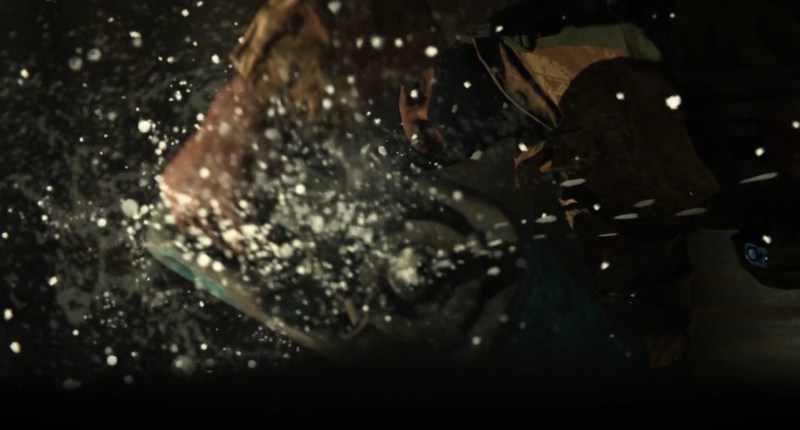
Above: A Russian guard waterboards Farah in Modern Warfare.
GamesBeat: And then scene in which Farah is tortured. There’s a way of doing storytelling where you suggest that’s happened. This one goes down the road of showing you that as it happens. Is there a reason to do it one way or the other?
Kurosaki: Again, I feel like that was — it might not be apparent to someone on their first playthrough, but in the same way that you appreciated the fact that in the end of Clean House, you didn’t have to shoot, you don’t have to participate in that second Farah flashback, in the imprisonment scene. We don’t fail the player if they can’t succeed because — a valid response to someone taking away your liberties and subjecting you to something like that would be shut down, to give in and turn inward.
That is a valid way to interact with that. The game doesn’t make you respond to him. It doesn’t make you succeed in not passing out from the waterboarding. You are able to. But because you’ve seen Farah as a full-fledged leader, and you’ve seen her origin story and where that leader was born, my guess is that most players do want to resist and use everything at their disposal to succeed in that mission, because they feel that’s what Farah would do in that situation.
Maybe I’ve mentioned this before, but we always go for this thing where — we’re looking for an emotional state of parity between our players and the characters they are playing as. If I know I’m playing as Farah, I’m probably going to behave in ways that I believe Farah would behave. Again, not because you think this what you’re supposed to do, but because you’re invested, and because you know enough about her. But I don’t know. If I was in that situation, I might just turtle. That’s a valid way to play that, and the game progresses regardless.
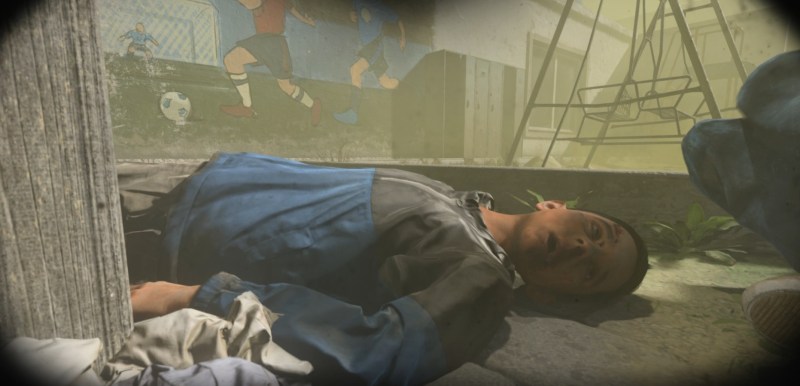
Above: Children are victims of an evil gas attack in Modern Warfare.
GamesBeat: Looking at all of this in context, you can see more reason for why it’s all in there. Do you ever look at it from a point of view of whether something belongs, or whether it might be pushing the line into something gratuitous?
Kurosaki: All the time. In everything we do, we’re always examining that. We have a mantra, a dogma that we’ve followed since day one on this project. It has a bunch of tenets, and one of the tenets — it’s a movie reference. This game is Jaws, not Saw. We would never put something in because it’s shocking. We ask that when team members propose something or have a suggestion or have an idea. We always say, “Yes, but why?” If someone says, “Well, it’s cool, it’s badass,” that’s never a good enough answer.
All of these things are purpose-built because we feel they’re necessary to tell the story. Any time anything doesn’t fit into that, if it feels superfluous, it’s out.
GamesBeat: Call of Duty means so many things to so many people now. There are some who’d say that Call of Duty doesn’t need a story at all. It’s interesting that you want to make something that people enjoy, that’s entertainment, but you’re also trying to make them think, and part of that is making them feel uncomfortable.
Kurosaki: It’s a juggling act, for sure. What I’d say to that — and Pat Kelly, our studio head, has said this before — is that Call of Duty has been around for a long time. With so many outings, it’s almost a genre unto itself. If Call of Duty just means “military,” let’s let it only be that and nothing more. Meaning that in the same way that you have Saving Private Ryan, versus some more visceral, spectacular, bombastic war film — well, those can both live under the Call of Duty umbrella. But it doesn’t mean that everything has to be painted with that brush of bigger, louder, badder, faster, more extreme, always at 11. It could be Band of Brothers. It could be things that are more thought-provoking.
Pat’s said to people who have seen and played the game, and this is what I would say too, “Go in with open eyes. Don’t color this according to every other thing that’s had that moniker on it.” This can be the thinking man’s outing of Call of Duty. That’s what we’ve tried to do. We’ve literally taken the word “Modern Warfare” and said, “Imagine there were no other games with that name, and nothing else called Call of Duty.” If we were going to make our own thing now, fresh, what would we make? And the answer is the thing you just played.
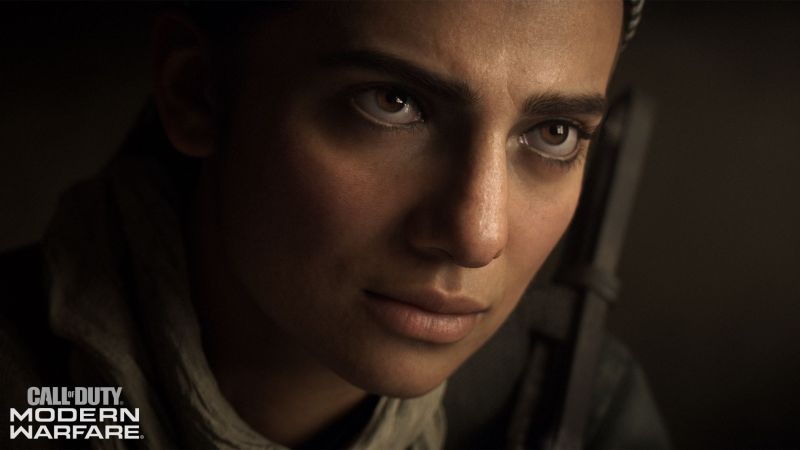
Above: Farah is one of the main characters of Modern Warfare.
GamesBeat: What I think is interesting here about that combination is going back to the notion that there are young people today who haven’t seen something like Saving Private Ryan. They haven’t read about a lot of these things in the world. Maybe they don’t know their history. They haven’t watched those documentaries that we mentioned. This might be the way they learn about something like this. It’s an interesting opportunity, and a responsibility too, that you can make all of this most memorable to people in a video game.
Kurosaki: I’ve thought about that thing precisely. If we can open people’s eyes and build empathy, if people can learn something about the world they live in through entertainment, that’s a powerful thing. Call of Duty is such a big platform. If Call of Duty has something to say, in a lot of ways that’s much more powerful than an indie game with a very small reach saying something. We have a much bigger amplification.
The analogy that someone else mentioned to me — they said that making something like this, that has a character like Farah in it, that talks about that side of war, that talks about how tough it is for these soldiers that are imperfect, that have imperfect intel, but that we expect to be perfect — if we can build that awareness and have people be entertained and have fun, then it would be like if Wal-Mart carried only organic produce. It’s a big thing like that that can make a big difference, versus something your corner farmer’s market that doesn’t have the reach.
GamesBeat: I think it’s turned out well. It’s made me think about a lot of these things.
Kurosaki: That was the hope. That was the intent.


